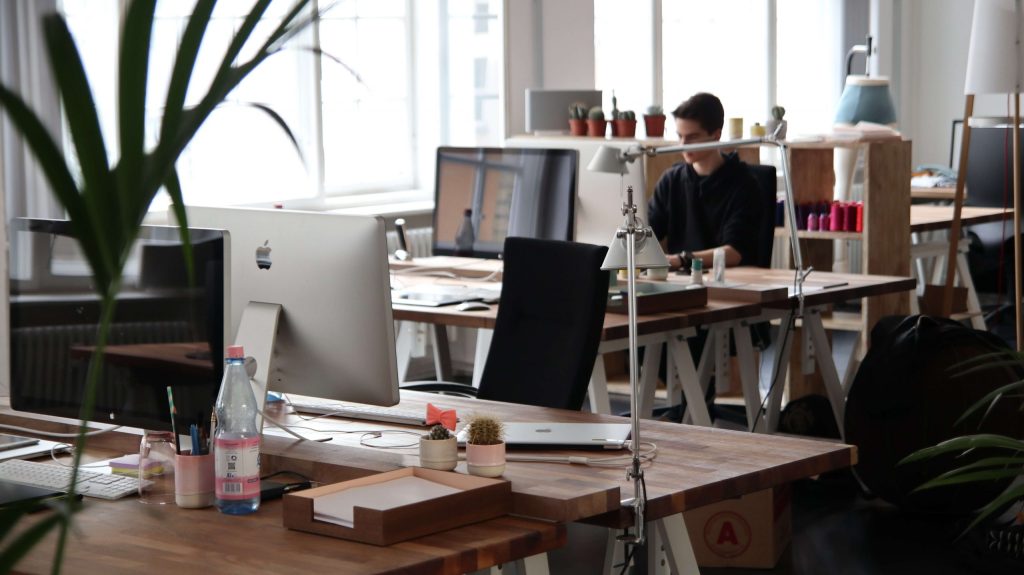Hot-Desking Vs. Hoteling: Which Is Most Productive?
- Updated on: July 24, 2024
Luxafor’s commitment to productivity extends beyond our gadgets. Our website is a treasure trove of valuable resources, offering articles, tips, and expert insights on various aspects of productivity. From time management techniques to creating a focus-friendly workspace, Luxafor empowers you with the knowledge to complement their tools and unlock your full potential.
With flexible and hybrid workspaces growing exponentially in popularity, managing such environments efficiently has become a hot topic. As a result, management systems such as ‘Hoteling’ and ‘Hot-desking’ are becoming increasingly common in organizations that seek to make their workspaces more comfortable, interactive, and productive.
Two prominent trends in this space are Hoteling and Hot-desking. While these terms are often confused for meaning the same thing, they actually refer to two fundamentally different ways of managing a workspace.
What is hoteling?
To manage a workspace, desk hoteling enables individuals to reserve and check into a centralized system before taking their seats at a workstation. In this way, it is similar to a traditional hotel system for reserving and checking into a room, hence the name.
With hoteling, a workspace user must record their attendance and the desk they will be occupying with the system before they can access the space. This step is necessary regardless of how many free spots the office may have available. Hoteling is a more systematic, formal option for workspace management than hot-desking when it comes to choosing a workstation.

The advantages of hoteling
Securing a particular spot
With hoteling, workers have greater control over where they work, allowing them to reserve a specific workstation for any duration. If a worker needs a set amount of time to focus intensely on a particular task, or if they simply know that they work best when they can base themselves at one desk and power through, hoteling allows them to do this. With hoteling, a worker’s desk will be there waiting for them, regardless of the time or day they arrive during their booking.
Supporting intentional collaborations
Hoteling allows team members to reserve workspaces near each other, facilitating enhanced productivity via collaboration and teamwork.
Supporting remote team members
Remote-working team members can find it hard to integrate into work settings that they rarely attend. Hoteling enables remote-working and other distributed team members to reserve a specific desk when they attend their physical work office, helping them to feel more like a member of the group.
The disadvantages of hoteling
Reservation errors
With hoteling, the successful tracking of who has reserved which desk and for how long relies largely upon the reservation software. If a flexible workspace uses subpar software or fails to keep good records, a reservation could be lost or double-booked, hampering productivity. If software crashes, the same will result.
Difficulty accommodating large teams
Unless many desks are successfully reserved nearby in advance, the chances of being able to accommodate large team collaborations are low with hoteling. Hoteling could be too limiting an option for any company that relies heavily on large-scale collaborations. Hoteling private offices instead of individual desks can be an excellent solution to this problem.
Lack of personalization
Some workers may thrive with a more flexible workspace model, while others may benefit most from having a workspace that they can personalize. For those employees, not having a spot of their own could negatively impact their morale, engagement, and productivity. That said, hoteling provides a greater degree – albeit still temporary – of workspace personalization than hot-desking does.

What is hot-desking?
Hot-desking, also known as ‘Shared Desks,’ is the practice in which a workplace provides a desk or workspace to a worker as needed, as opposed to providing a fixed workstation.
With hot-desking, workers have the flexibility to move around the office freely. The trend toward hot-desking is built upon the modern focus of encouraging flexibility, increasing interactivity between employees, and networking opportunities.
The advantages of hot-desking
Short-notice availability
With hot-desking, individual workers or teams of employees can walk in, find a free space and get to work on short notice.
This level of flexibility is particularly useful for freelancers or remote workers who need to occasionally change it up and take a break from working from home. It is also a great solution for travelers who need a professional place to work for a few hours, perhaps before they move to a new destination.
Autonomy for employees
Successful remote working relies on autonomy and individual responsibility. Hot-desking communicates to employees that they are trusted to manage their own work time and projects, significantly boosting morale and productivity.
Improved organization
With hot-desking, the cluttered accumulation of an individual’s personal belongings in and around their workstation is avoided. Hot-deskers must leave a workspace clean and clear, ready to welcome the next worker. This expectation leads to cleaner, more organized workspaces that look more professional and thus inspire more focus and productivity. It also makes for easier cleaning and sterilization.
The disadvantages of hot-desking
The risk of no available space
The primary drawback of hot-desking is that available space is never guaranteed when you want to work. In this case, workers either have to wait for some space to become available, or they simply have to go somewhere else to work. This lack of certainty around available workspace can significantly interrupt productivity.
Increased security concerns
Switching workspaces regularly can lead to an increase in security concerns, both for employees and organizations. For workers, using a hot-desking space requires enhanced vigilance regarding where they leave their personal belongings. When it comes to organizational security concerns, companies who deal with confidential documents and sensitive information are at increased risk of a security breach with employees changing workstations regularly. Not having a designated workstation can lead to documents being left where they shouldn’t.
Health and safety
Hot-desking creates a high turnover of employees using a variety of workspaces, which can contribute to the spread of disease in a workplace. An office that operates with a hot-desking model could see eight or more employees using one desk through the course of one eight-hour business day. Therefore, additional training, employee education, and cleaning are necessary to keep such a workspace sanitized and optimally safe for use.

Hoteling VS Hot-Desking
While both hoteling and hot-desking are extremely popular in modern office workspace management, there are some particular advantages and disadvantages to both.
When deciding between the two, time and space management are key factors to consider. Hoteling provides a more controlled structure and atmosphere, while hot-desking creates a more dynamic, flexible environment. Either can arguably boost productivity depending on the nature of the business being conducted and the needs of the individual workers. If your organization’s needs leave you torn as to which is best suited, it may be helpful to conduct an employee survey and go from there.
LUXAFOR HELPS PEOPLE TO ACHIEVE THEIR GREATEST PRODUCTIVITY LEVELS WITH A WIDE VARIETY OF OFFICE PRODUCTS. LET’S BE PRODUCTIVE TOGETHER!



